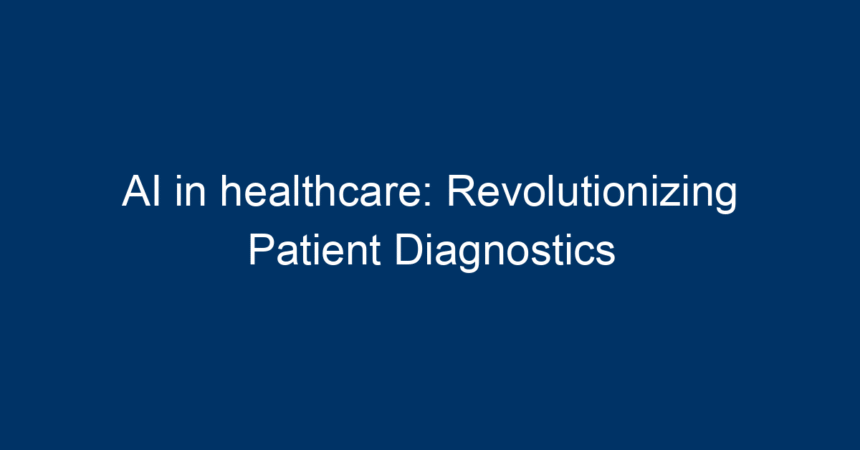Introduction
The healthcare industry is undergoing a transformative shift, largely fueled by the integration of technology. At the forefront of this evolution is AI in healthcare, a powerful tool that enhances patient diagnostics and improves clinical outcomes. With AI algorithms analyzing massive datasets in real-time, healthcare professionals can make informed decisions, streamline processes, and ultimately provide higher-quality patient care. This article will explore how AI is revolutionizing patient diagnostics, the technologies driving this change, and actionable insights for healthcare providers.
Understanding AI in Healthcare
AI in healthcare refers to the application of artificial intelligence technologies, including machine learning and natural language processing, to solve complex healthcare problems. These systems can mimic human cognition in analyzing, interpreting, and predicting medical outcomes. By processing vast amounts of data, AI enhances diagnostic accuracy, identifies patterns, and allows for a more personalized approach to treatment.
Key Technologies Driving AI in Healthcare
-
Machine Learning: This subset of AI enables systems to learn from data, identify trends, and make predictions without being explicitly programmed. In diagnostics, machine learning algorithms can analyze symptoms, medical histories, and test results to suggest possible conditions.
-
Natural Language Processing (NLP): NLP allows computers to understand and interpret human language. In healthcare, this can be applied to patient records to extract valuable information, ensuring that healthcare providers have the data they need at their fingertips.
- Deep Learning: A more complex form of machine learning, deep learning uses neural networks to analyze intricate data patterns. This is especially beneficial in imaging diagnostics, where algorithms can detect anomalies with accuracy that often surpasses human experts.
The Role of AI in Patient Diagnostics
Enhancing Diagnostic Accuracy
One of the primary advantages of AI in healthcare is its ability to enhance diagnostic accuracy. Traditional diagnostic methods often rely on human expertise, which can be subjective and prone to error. AI systems, on the other hand, leverage vast datasets to provide data-driven insights.
Example: In radiology, AI algorithms can analyze medical imaging, such as X-rays and MRIs, to identify conditions like tumors, fractures, or other anomalies. A study published in the journal Nature found that AI systems diagnosing breast cancer significantly outperformed human radiologists, reducing false positives and improving detection rates.
Prediction and Risk Assessment
AI can predict potential health risks before they become critical. By analyzing patient data, including demographics, lifestyle factors, and previous medical conditions, AI systems can identify individuals at risk for diseases like diabetes, heart disease, and various cancers.
Example: Companies like Tempus use AI to create personalized treatment plans by integrating genomic data with clinical information, helping doctors estimate a patient’s unique risk of developing certain diseases.
Streamlining Administrative Processes
AI in healthcare is not limited to diagnostics; it also plays a pivotal role in streamlining administrative tasks. Scheduling appointments, managing patient records, and handling billing can be time-consuming and inefficient, but AI can automate many of these processes.
Example: Chatbots powered by AI can answer patient queries, schedule appointments, and provide follow-up care instructions, allowing healthcare providers to focus more on patient care rather than administrative tasks.
Personalized Medicine
With AI, the future of medicine is shifting towards personalized treatment plans tailored to an individual’s genetic makeup and health history. By analyzing data from diverse sources, including genetic information and previous treatment outcomes, AI can provide insights that lead to more effective treatments.
Example: Companies like 23andMe are employing AI to analyze genetic data and offer personalized health insights, enabling individuals to make informed decisions about their health.
Case Studies of AI in Patient Diagnostics
IBM Watson Health
IBM Watson Health has been a pioneer in applying AI to healthcare. Watson uses natural language processing and machine learning to interpret medical literature and clinical trial data, providing healthcare professionals with evidence-based treatment options. In oncology, Watson has helped oncologists determine cancer treatment plans based on a patient’s unique genetic makeup, drastically improving treatment efficacy.
Zebra Medical Vision
Zebra Medical Vision focuses on medical imaging and has developed a range of algorithms for automatic analysis. Their AI system analyzes medical scans for over 40 different diseases. The algorithms are designed to assist radiologists, reducing the time needed for image analysis and increasing diagnostic accuracy. Many hospitals are leveraging Zebra’s technology, leading to quicker, more accurate diagnoses.
Challenges and Ethical Considerations
While AI in healthcare presents numerous benefits, it is not without challenges. Issues such as data privacy, the ethical implications of machine-driven decisions, and the potential for algorithmic bias must be addressed.
Data Privacy
Patient data is highly sensitive, and concerns around privacy are paramount. Healthcare providers must ensure that AI systems are compliant with regulations like HIPAA, guaranteeing that patient information is protected.
Bias in Algorithms
AI systems are trained on historical data; if this data is biased, it may lead to skewed results. Ensuring diversity in training datasets is critical to create fair and accurate AI systems.
Actionable Insights for Healthcare Providers
-
Invest in Training: As AI becomes more integral to healthcare, providers must invest in training staff to understand and leverage these technologies effectively.
-
Adopt a Data-Driven Approach: Implement AI systems that can analyze and manage patient data, ensuring that clinical decisions are informed by comprehensive insights.
-
Ensure Compliance: Stay updated on regulations surrounding data privacy and AI usage in healthcare, ensuring compliance while adopting new technologies.
-
Engage Patients: Educate patients about how AI is being used in their diagnostic processes, fostering trust and transparency.
- Collaborate with Tech Companies: Form partnerships with AI tech companies to stay at the forefront of developments and innovations in the field.
Conclusion
AI in healthcare is more than just a technological advancement; it is a revolutionary tool that has the potential to change the landscape of patient diagnostics. By enhancing accuracy, predicting risks, and personalizing treatment, AI helps healthcare professionals make informed decisions that improve patient outcomes. While challenges exist, the path forward is clear: embracing AI not only enhances the efficiency of healthcare systems but fundamentally transforms how we approach patient care. As healthcare providers navigate this new terrain, harnessing the power of AI will be key to unlocking a healthier future for all.




